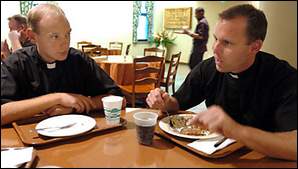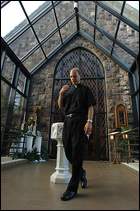Screening to become a priest has changed: Candidates agree to a background check, go through a daylong battery of tests and are reviewed by a committee of priests
By Gary Soulsman
The [Wilmington DE] News Journal
November 22, 2005
http://www.delawareonline.com/apps/pbcs.dll/article?AID=
/20051122/NEWS/511220349/0/NEWS01&theme=PRIESTABUSE
[See links to other articles, documents, and transcripts of interviews in this series.]
John Olson wants to embody the love of Jesus.
And the 29-year-old Olson is confident that a new generation of priests can overcome the lingering shame of the sex-abuse scandals.
"Some people have done terrible things to mar the image of priests and it falls on our shoulders to rebuild that reputation," he said.
 |
| Seminarian John Olson (left) of the Diocese of Wilmington and fellow seminarian Larry Swink of Silver Spring, Md., say there's been a good deal of discussion at Immaculate Conception Seminary in South Orange, N.J., about how the Catholic Church can renew itself in the wake of the abuse scandals. The seminary has put a new focus on the teaching of celibacy. The News Journal / Ginger Wall |
Olson is a third-year student at Immaculate Conception Seminary at Seton Hall University in South Orange, N.J., a graduate program in theology that leads to priestly ordination when all goes well.
Immaculate Conception is the alma mater of Bishop Michael A. Saltarelli of the Diocese of Wilmington. The seminary is one of the main training programs for the diocese. St. Mary's Seminary in Baltimore is another.
A tall, trim athlete, Olson is known in the residence hall for his commitment to prayer and his competitive interest in foosball and Ultimate Frisbee.
 |
| Seminarian John Olson of the Diocese of Wilmington |
The very fact that he is preparing to be a priest shows "God has a sense of humor," Olson said. "After all, I had my whole life planned in another vocation."
A devout man, he is one of 65 in residence at Immaculate Conception. He is also one of 13 men the Diocese of Wilmington is training in parishes or seminaries. They are men who represent a new generation of the clergy, said psychologist Thomas G. Plante, a consultant to dioceses and religious orders on training for ministry.
Four decades ago, screening usually consisted of a spiritual autobiography, references and some interviews, Plante said. Quite often boys entered high school seminaries as teenagers.
There was little psychological testing to weed out troubled men who sometimes sought the priesthood to mask predatory desires, and there was a less sophisticated understanding of sex offenders, Plante said. That's one reason an audit of the nation's dioceses showed the most abuse cases occurring before the mid-1980s.
More recently, candidates have tended to be closer to 30, to have more worldly experience and to only be accepted into the seminary after a full clinical interview by a psychologist. Tests include the Minnesota Multiphasic Personality Inventory used to help identify personal, social and behavioral problems such as an antisocial personality disorder, associated with impulsive and criminal activities.
"The psychological screens are so much better than before," Plante said. "And that's good news, even though you can't have a 100 percent foolproof method."
The result is that more candidates inquire about a life in ministry than are accepted into the priesthood, said Rev. Joseph Cocucci, director of vocations in the Diocese of Wilmington.
The graduate seminary program is rigorous, too, requiring four or five years. Cocucci likens it to life in a "fishbowl," with more than 20 reviews of a candidate's preparation to become a priest.
Each man has a spiritual director who helps discern God's presence in a man's life. Each man also has a mentor who reports to the faculty on how a candidate is advancing in his understanding of theology. Assignments in parishes, akin to internships in the corporate world, are evaluated, too.
"The faculty has to reach moral certitude on each man," said Monsignor Robert Coleman, rector of Immaculate Conception. "The process is not infallible. But the way you see a man in seminary is the way you usually observe him in priestly life."
That life can be enormously satisfying, says the Rev. Andrew Greeley,
a Chicago author and sociologist. And in thousands of parishes, he said,
they are loved and respected for what they do.
Life experiences
A lifelong Catholic, Olson is a Long Island, N.Y., native who went on to Duke University, where he studied history, German and business. He was in ROTC and after graduation served in the Air Force.
He liked being a logistics officer and imagined he would stay for a 20-year career and marry a Long Island woman whom he loved. But they ended their engagement and Olson felt God calling him into a deeper relationship.
While he was stationed in Albuquerque, N.M., people in his parish commented on his faith. Later, he transferred to Dover Air Force Base and a seminarian told Olson that he had the makings of a priest.
He talked to the diocesan director of vocations. What he saw was that the diocese was interested, if he could show maturity and stability.
"There were pointed questions about sexual attraction and celibacy," Olson said.
In the past two years, the process for selecting candidates has grown more comprehensive, said Cocucci. For one thing, Cocucci designed a new application after consulting with several dioceses.
The result is an exhaustive 20-page form that covers family, education, civic activities, religious life and more. A candidate is expected to provide numerous recommendations, agree to a background check and write about his spiritual joys and challenges. He is given a daylong battery of tests, a clinical interview and further review by a committee of priests.
"By the time someone gets to seminary, we're as certain as we can be that someone is not going to pose a danger," Cocucci said.
Unfortunately, that certainty can never be 100 percent. Predators can be charismatic and accomplished, said Marie Fortune of Seattle, an expert on sexual abuse, who founded the FaithTrust Institute to work on these issues.
If seminary faculty members are sexually active with candidates, it also sets a bad example for men preparing to be priests, she said.
"This is why we need other protections in parishes, such as background checks and education of children on these issues," Fortune said.
Communal life
At Immaculate Conception Seminary, Olson lives a communal life built around religious studies, worship, socializing and sports.
Rhythms of the day start in the chapel with a prayer at 6:45 a.m. and Mass at 7:15 a.m., followed by breakfast and morning classes. In the afternoon, there is often time for sports and homework. Evening prayer is at 5:30.
One of his friends is Larry Swink of Silver Spring, Md. In his last year of seminary, Swink says being around so many men with a higher goal is a great experience.
"This is about the only place where your job is to get closer to God," said Swink. "It's a chance to see who you are and who God is."
The 29-year-old Swink is a former stockbroker who found the world's materialism unsatisfying. He also pursued a religious vocation at a time when the sexual scandals were a constant distraction.
"It left a wound," Swink said. "I realize our job is to win back the trust of the people."
He said the seminary took the scandals seriously, offering students many opportunities to talk about the issue. And there were many talks on pastoral ethics and situations that priests must avoid. There was so much discussion it was wearying, Swink said.
That's very different from 40 years ago when discussions of sex were surrounded by denial, reticence and embarrassment. Today the theology of celibacy is talked about a great deal, along with the struggle of maintaining one's vow, Swink said.
"Celibacy is the greatest obstacle to the priesthood and we say celibacy is not natural, it's supernatural," he said. "It's all done through the grace of God."
It's a vow that John Olson says he is ready to take.
Contact Gary Soulsman at 324-2893 or gsoulsman@delawareonline.com.
Any original material on these pages is copyright © BishopAccountability.org 2004. Reproduce freely with attribution.